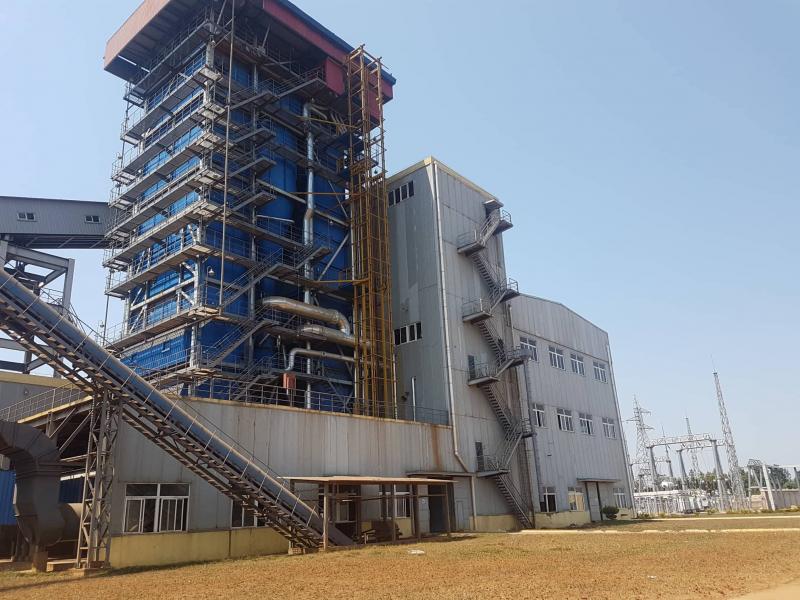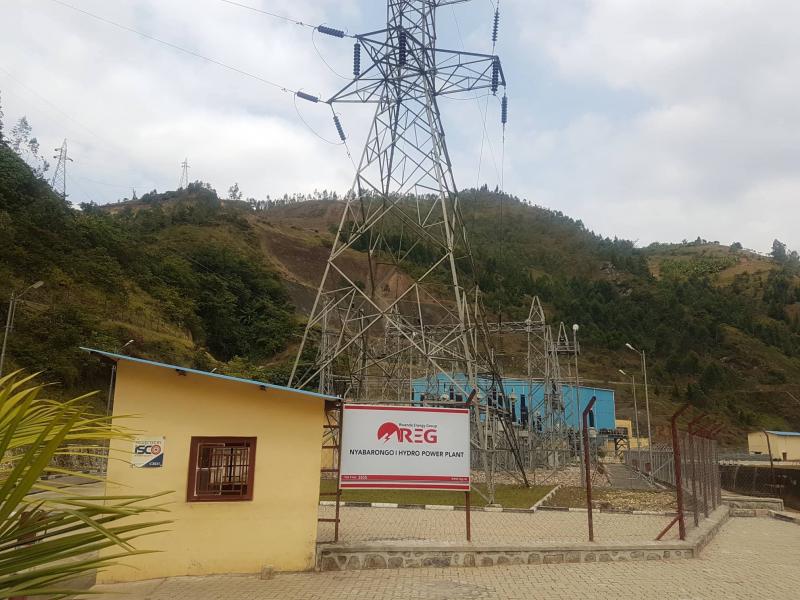Rwanda

The Government of Rwanda envisions universal energy access by 2024. Rwanda is endowed with natural energy resources including hydro, solar, and methane gas. It currently only has 218 MW of installed generation capacityand an estimated 30% national electrification rate. In order to reach their electrification goal, Rwanda needs to rapidly expand generation, transmission, and distribution systems. EUPP partnership programs work with the Rwandan utilities in two major areas – integrating renewable generation into the grid and improving stability and reliability of the national grid.
Improved Capacity for Regional Trading
USEA training enabled Rwanda Energy Group (REG) to conduct joint studies with the Uganda Electricity Transmission Company Ltd (UETCL) on interconnected operations of the Rwandan and Ugandan power systems. The studies included steady-state, fault, and partial stability analyses to produce an assessment of network conditions after Rwanda’s power system connected to the existing interconnection between Uganda and Kenya. The assessment identified possible issues with the interconnection that might violate Rwandan and Ugandan network security, allowing both utilities to preemptively detect grid issues, improve their national grid stability and reliability, and increase the number of regional electrical interconnections, thus facilitating regional power trading.
Joint Operational Procedures Developed
The training also enabled REG to develop joint system operational procedures with UETCL to determine measures for outage planning on the new interconnected line; synchronizing both systems’ frequency and tie-line flow controls, spinning reserves, and power support and system voltage coordination; and restoration procedures and communications protocols. This work strengthens regional cooperation in real-time grid operations, regulates operations in Rwandan and Ugandan interconnected power systems, and improves stability and reliability of both countries’ national grids.
High voltage grid issue solved
Based on studies’ recommendations and discussions at USEA workshops, Energy Utility Corporation Limited (EUCL) engineers have implemented a measure that resolved a persistent high-voltage issue in Rwanda’s grid during nightly low-load conditions that led to rapid aging of network equipment and consumer outages.
Under frequency load shedding protection scheme introduced
EUCL introduced a new under-frequency load-shedding protection scheme that will prevent collapse of the system and minimize load shedding in case of large system disturbances. This solution was developed based on previous studies and trainings facilitated by USEA in the first phase of the project.
Technical solutions to massive decrease in demand developed
Due to closing of major industries caused by the COVID-19 pandemic, Rwanda is experiencing up to 50% drop in demand for electricity, a huge challenge to managing reactive power in the country's relatively small grid and avoiding blackouts. At a virtual discussion organized by USEA, consultants from the Belgrade-based Electricity Coordinating Council (EKC) offered technical solutions to resolve reverse power issues and restore grid stability.
RWANDA UTILITY PARTNERSHIP (2017-present)
USEA assists the Rwanda Energy Group (REG) and its subsidiary, the Energy Utility Corporation Limited (EUCL), with capacity building in two major areas – integrating renewable generation into the grid and improving stability and reliability of the national grid. This technical assistance has been delivered within the framework of two projects – Long-Term Planning and Network Modeling and Reviews of Black Start Plan, Relay Protection Coordination, and Power System Stabilizers. A new project – On Improving Operations of the National Control Center – will be launched later in 2020, once COVID-19 related travel restrictions are lifted.
This technical assistance helps Rwanda achieve its goal of universal access by 2024 by allowing reliable integration of renewable generation, providing better regional electrical interconnection by improving overall stability and reliability of the country’s grid, and ultimately facilitating regional power trading.
Reviews of the Black Start Plan, Relay Protection Coordination, and Power System Stabilizers (PSS): In January 2020 a new project was launched to conduct comprehensive assessments of REG’s Black Start Plan, including line/cable charging strategies, protective systems and general restoration policies; current transmission and distribution relay protection coordination; and the effectiveness of integrated power system stabilizers in enhancing the stability of the national grid. The activity, expected to be completed by August 2020, will produce a comprehensive reports for each issue, identifying existing deficiencies and possible issues, and proposing technical solutions and recommendations for improvement.
Project on Improving Operations of the National Control Center: USEA will hire consultants to perform an audit of the National Control Center’s operations and procedures related to system operations, and to train control center dispatchers to ensure that they possess the skills necessary to operate the Control Center effectively, efficiently and safely. The activity, expected to commence in the Fall 2020, once COVID-19 related travel restrictions have been lifted, will improve REG and EUCL’s capacity for managing Rwanda’s grid effectively and delivering uninterrupted power supply.
Long-Term Planning and Network Modeling: In 2017 – 2019, USEA assisted the Rwanda Energy Group (REG) and its subsidiary, the Energy Utility Corporation Limited (EUCL), with capacity building in the area of long-term planning and network modeling. In July 2019, in response to REG’s request for urgent technical assistance, the project was extended to include additional work on frequency and voltage control issues. This work will allow for reliable integration of the new generation, will help detect grid issues before they become a problem, allow greater regional electrical interconnection and ultimately facilitate regional power trading.
Main achievements of this project included:
National load flow and dynamic models developed
Developed and validated national load flow and dynamic models representing two characteristic regimes (peak and off-peak) and three topology scenarios for each regime (wet, average and dry hydrology).
Planning models developed
Developed and validated planning models for 5 and 10 year horizons;
System Reliability and Stability Studies completed
Conducted two System Reliability and Stability Studies - for Current and Prospective States. It further enhanced REG’s capacity for integration of renewable energy power plants by resolving current network instability issues, caused by inadequate frequency and voltage controls due to renewable energy expansion.
EAST AFRICA GEOTHERMAL PARTNERSHIP (EAGP)
The EAGP, which ran from 2012 to 2018, promoted the development of geothermal energy resources and projects in East Africa. The EAGP program, which was aa partnership between USAID and the Geothermal Energy Association (GEA), encouraged and facilitated the involvement of the U.S. geothermal industry in the region. EAGP focused on six priority countries: Djibouti, Ethiopia, Kenya, Rwanda, Tanzania, and Uganda.
Through EAGP, USEA provided technical and transaction advisory support and capacity building to public organizations and government ministries involved in geothermal development in the region through executive exchanges, workshops and short-term technical assistance assignments to learn about geothermal best practices from their counterparts in the U.S. and third countries.
Facilitated U.S. Business Connections
Through the EAGP-sponsored exchange program to the GEA Expo and GRC Annual Meeting, Ethiopian and Kenyan geothermal officials made contacts with over 70 U.S. firms that supply many of their needed goods and services. EAGP delegates and their senior colleagues in attendance were able to generate new interest in the EA geothermal market among a larger audience of U.S. companies, through presentations on opportunities and procurement needs in EA (organized by EAGP and GEA). The successful event has resulted in a plan to engage U.S. industry members to give feedback on GDC’s, and possibly KenGen’s, tender design. This will improve GDC’s ability to execute transactions related to their goods and services tenders.
Provided Guidance for Development of East African Geothermal Centre of Excellence
Worked with industry experts and advisors to provide feedback and guidance based on the findings of the Icelandic International Development Agency (ICEIDA) Feasibility Study for the East African Geothermal Centre of Excellence and help to design curricula for the Centre
Assisted with Creation of Joint Development Agreement for PPPs
EAGP facilitated a short-term technical assistance program for Kenya’s GDC on producing a joint development agreement for PPPs in geothermal development. EUPP worked with GDC and MoF on the legal structures, financially viable project structures for PPPs and developed a set of recommendations for GDC and produced a market assessment of GDC’s proposed joint development structures.
Assisted in Development of Geothermal Strategies
Provided support to USAID and Power Africa Transactions and Reforms Program (PATRP) in updating and implementing the Power Africa Multi-Donor Geothermal Strategy for East Africa and assisting USAID in developing its own internal Power Africa inter-agency geothermal strategy.
EASTERN AFRICA POWER POOL PARTNERSHIP (EAPP)
Rwanda is also a member of USEA’s regional Eastern Africa Power Pool (EAPP) Partnership that currently focuses on advanced modeling and long-term planning. USEA will facilitate a series of training programs on load flow modeling and conducting security analyses using PSS/E software platform. These trainings will address insufficient levels of modeling and planning capacity among EAPP planning staff and planning committee members in individual countries. It will also build EAPP’s capacity in the advanced application of the PSS/E software, specifically in advanced power flow, contingency, voltage stability and dynamic analysis, transmission planning, power system operation, and the integration of renewable energy and HVDC systems. The first training session took place in Kigali, Rwanda in January 2020.
EASTERN AFRICA REGIONAL TRANSMISSION PLANNING PROGRAM (EATP)
The Eastern Africa Regional Transmission Planning Program (EATP) was conducted in 2014 – 2018 to foster regional cooperation in transmission planning and analysis between Ethiopia, Burundi, Kenya, Tanzania, Rwanda, and Uganda. The EATP developed the capacity of transmission planners in Kenya, Ethiopia and Tanzania to develop regional electric power transmission corridors that will (1) serve as the backbone infrastructure for trade and exchange of electricity, (2) enable investment in new electric power generation plants, (3) support integration of clean energy generation resources, and (4) improve system reliability. The EATP created a Working Group that continued to further refine the national planning models to support regional harmonization and reviewed regional models. The Working Group members include the following organizations: the Eastern African Power Pool, EEP, Kenya Electricity Transmission Company, Ltd., KPLC, TANESCO, Régie de Production et Distribution d'Eau et d'Electricité, Rwanda Energy Group, Ltd., and Uganda Electricity Transmission Company, Ltd. Under EUPP, the EATP developed regional network planning models, beginning with a load flow model for East Africa, progressing to dynamic models over time. The members of the EATP Working Group were trained to prepare each of the models, expanding the pool of qualified network planners in East Africa to continuously fine tune the regional planning model. Topics covered under this partnership included:
- EATP Regional Network Load Flow Models;
- EATP Load Flow and Dynamic Training;
- Study to Calculate Losses for the EKT Wheeling Transaction; and
- NELSAP/TRACTABEL Study Review.
National Power Balance Settling
The development of a consensus for settling national power balances (import/export) within the regional model for each country. The national power balances will form the basis of the network analysis to be completed using the 2020 load flow model.
Development of a Regional Project Tracker
The initiation of a Project Tracker to determine the probability of commissioning generation and transmission projects within the planning horizon being analyzed (2020).
Adoption of Terms of Reference
EATP countries adopted a Terms of Reference to conduct a sensitivity analysis of regionally significant candidate transmission investment projects using agreed upon parameters.
Self-Assessment Dynamic Modeling and Analysis Tool Developed
The creation of an EATP Self-assessment Dynamic Modeling and Analysis Tool to enable transmission utilities to identify network planning institutional and human resource and capacity deficits and benchmark their capacity against one another.
Creation of Standard Operating Procedures Manual
The creation of a step-by-step Standard Operating Procedures Manual that outlines the planning criteria, defines strict requirements and gives directions and recommendations for construction, usage and update of the EATP regional model in load flow software.
NILE EQUATORIAL LAKES SUBSIDIARY ACTION PROGRAM (NELSAP) PARTNERSHIP
Ethiopia is a member of USEA’s regional Nile Equatorial Lakes Subsidiary Action Program (NELSAP) Partnership. In 2016 and 2017, the NELSAP Partnership focused on capacity building activities for NELSAP member states (Ethiopia, Kenya, Rwanda, Tanzania and Uganda) on the issues of contract and project management. EUPP facilitated several regional workshops for project management specialists, engineers, financial analysist and legal advisors from East African utilities on contract development and negotiations, best practices in procurement, risk management, and dispute resolution. Workshop deliverables included customized project management documents and templates, as well as action plans for regional utilities to improve their contract and project management practices.
In 2019, the NELSAP Partnership’s focus shifted to power trading with the following objectives:
-
Creating awareness among regional power industry stakeholders on possible mechanisms for allocation and compensation for ancillary service costs, as well as energy storage alternatives, based on U.S. and other international practices;
-
Providing senior regional government officials and utility management with clear understanding of the existing gaps in the current set-up of ancillary services in the East African region;
-
Creating a platform for generating sustainable discussions among East African energy stakeholders on policy, regulatory and market barriers for developing both local and regional ancillary and energy storage markets.



